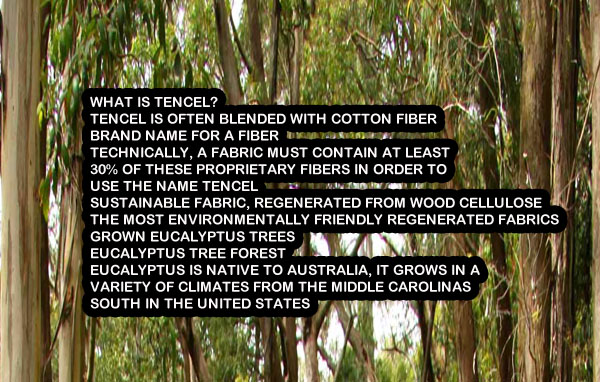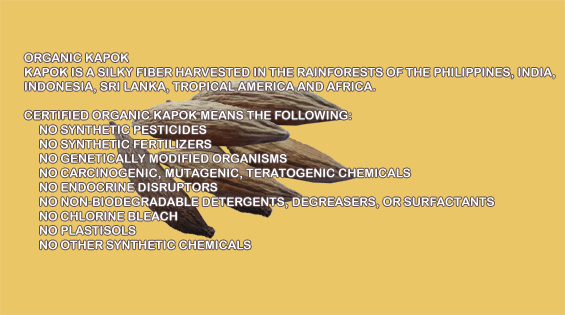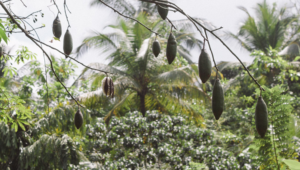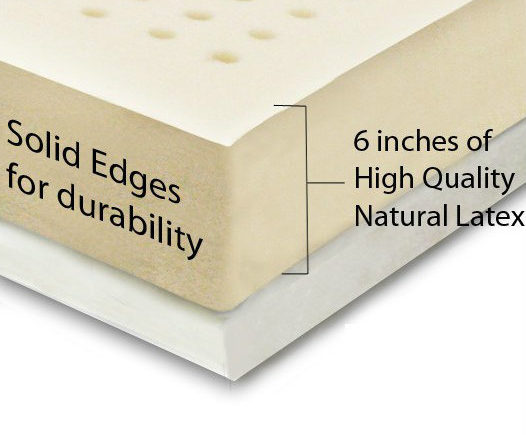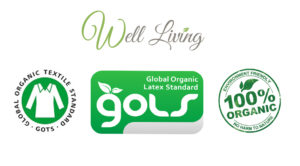Organic Kapok
Organic Kapok
Kapok is a silky fiber harvested in the rainforests of the Philippines, India, Indonesia, Sri Lanka, tropical America and Africa.
Certified organic kapok means the following:
NO synthetic pesticides
NO synthetic fertilizers
NO genetically modified organisms
NO carcinogenic, mutagenic, teratogenic chemicals
NO endocrine disruptors
NO non-biodegradable detergents, degreasers, or surfactants
NO chlorine bleach
NO plastisols
NO other synthetic chemicals
Kapok is a Grate Tree
Well Living Shop
Bamboo Organic Shredded Latex Pillow
Chat Service
1″ Natural Latex Topper
Overview
1″ Natural Latex topper
made without the use of harmful chemicals
Pin core design for superior airflow
Pressure point relief system
Anti-microbial, hypo-allergenic, dust mite resistant and anti-fungal
Optional snug fit covers
This 1″ natural latex topper is made of liquid latex from rubber trees through the dunlop process. These rubber trees, also known as Para or Hevea brasiliensis, are naturally grown in Sri Lanka. Its high level of natural purity ensures no chemicals are added to the topper, providing you with long term health benefits. The latex conforms just enough to give your body the support it needs through out the night. This helps with relieving back pain and adjusting spine and posture. Its heat sensitivity, static free surface, allows for a splendid nights sleep. It benefits include being pure, anti-microbial, hypo-allergenic, dust mite resistant, anti-fungal and very durable.
Size-
Twin 38″ x 75″ Twin XL 38″ x 80″ Full 53″ x 75″
Queen 60″ x 80″ King 76″ x 80″ Cal King 72″ x 84
Well Living Shop-Baby
Health Benefits
It’s true that conventional baby clothing and bedding— conventional referring to that made with cotton grown using synthetic pesticides and fertilizers and bleached and dyed with yet more harsh chemicals— hasn’t seemed to present a problem thus far for generations and generations of babies. But more awareness of chemical sensitivities has many environmentalists and public health advocates wondering if the clothes and bedding children are exposed to could be impacting their health negatively.
Some 25 percent of the world’s pesticides and 10 percent of insecticides go to cotton crops every year. In addition, petroleum scouring agents, softeners, brighteners, heavy metals, flame and soil retardants, ammonia and formaldehyde are used in the processing of cotton once it is harvested. Beyond the environmental impacts of this onslaught in the vicinity of production facilities, there is increasing concern that residues of some of these chemicals might rub off on baby. According to Rachel Birchler of Mooi, a Pittsburgh-based organic children’s clothing boutique, a baby’s skin is more porous and thinner than that of an adult, and as such absorbs stuff more easily. “This means that children are at greater risk for pesticide-related health problems than adults,” she says.
Johnson & Johnson, one of the world’s leading purveyors of baby products, states on its website that “a baby’s skin is thinner, more fragile and less oily than an adult’s” and is “less resistant to bacteria and harmful substances in the environment.” Lotus Organics, which makes organic clothing for both babies and adults, reports that “millions of children in the U.S. receive up to 35 percent of their estimated lifetime dose of some carcinogenic pesticides by age five through food, contaminated drinking water, household use, and pesticide drift.”
So if organic cotton is so much better all around, why aren’t we all swaddling our babies in it and wearing it ourselves? It’s all about cost. Clothing and bedding made from organic cotton is typically more expensive than similar products made with conventional cotton. Consumers watching their spending are often unwilling to pay more for a t-shirt or pants that are just going to get spilled on and beaten up.
But boosters for organic cotton say that paying less for conventional cotton items is penny wise and pound foolish. “Conventionally produced cotton material lasts 10-20 washes before it starts to break down,” reports Mooi’s Birchler. “An organic cotton material lasts for 100 washes or more before it begins to wear down.” How could that be? “Conventionally produced cotton take so much abuse in production because it goes through scouring, bleaching, dying, softeners, formaldehyde spray, and flame and soil retardants before it is even shipped to be cut for patterns,” she explains.
Also, with more and more organic cotton products becoming available every day, the price premium for going organic is starting to shrink. Check out our organic baby bedding for more info

